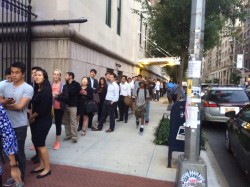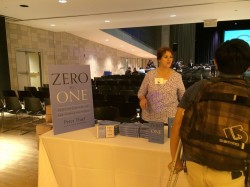Peter Thiel is a co-founder of PayPal and an early investor in Facebook. Yesterday night, he came to campus to promote his new book, Zero to One: Notes on Startups, or How to Build The Future. Armchair Analyst Kevin Chen went to see what it was all about.
As an audience consisting mostly of well-dressed B-school students filed in, songs from the Mulan soundtrack played over the speakers. The line to get into the event stretched across 114th Street and past Butler. But if you thought that was long, the list of event co-hosts was even longer: Columbia Organization for Rising Entrepreneurs, The Eugene Lang Entrepreneurship Center at Columbia Business School, and Columbia University Entrepreneurship.
After promising Vincent Ponzo, Director of the Lang Center, that we’d give Thiel a “warm New York City welcome” (if such a thing even exists), we finally got to see the man himself.
According to Thiel, Zero to One is about the unique moments that happen when someone creates a new product for the first time: maybe the first airplane, or the first iPhone. Do these events have anything in common with each other that can be applied again and again? Thiel says yes—and that’s the question the book tries to answer.
“We’re living in a world where courage is in even shorter supply than genius,” Thiel likes to say, meaning that people are more afraid to deviate from what they’ve been taught, keeping them from pursuing new ideas they come up with. The book focuses on what Thiel calls “contrarian answers”—challenges to conventional wisdom. Most people believe this, but that’s not the truth. Most people believe capitalism is synonymous with competition, but Thiel claims they are opposites. Google is a capitalist (making a lot of money) because it has no competition. There’s a ton of competition for NYC restaurants so none of them are making that much money. “The people who have monopolies don’t talk about them”—Google defines itself as a technology company competing in many areas against the likes of Apple, Facebook, and Microsoft, to draw attention away from its monopoly in search.
People seek competition because there’s a sense of safety in crowds. Thiel takes this opportunity to talk about his background. He started out as your stereotypical Ivy Leaguer: after graduating from Stanford (shush, it’s the Ivy League of the west coast), he went to law school and worked at a NYC law firm. Through a “quarter-life crisis,” he realized that he hated how his coworkers always tried to one-up each other. Thiel moved to California and started PayPal during the tech boom of the late 1990s.
Thiel wraps up his prepared statement by touching on the trade-off between globalization and technological innovation. In the last 40 years, the world has been focused on copying and globalizing at the expense of innovation—for instance, we aren’t seeing many solutions to the energy and transportation problems. It’s even reflected in our language: the developing world is supposed to copy the developed. “When we say we live in the developed world, we say that there will be nothing new. We should be asking how we can develop the developed world.”
In the next part of the event, Shane Snow, Journalism ’10 and co-founder of Contently, interviewed Thiel. The first thing he wanted to know was, why did Thiel write the book? Zero to One came out of a class on startups that Thiel taught at his alma mater, Stanford, in spring 2012. A student named Blake Masters started posting his notes online, and they were such a big hit that Thiel asked Masters to work with him and turn those notes into a book.
If monopoly is the condition of every successful business, Snow prompted, how do you explain big companies that also seem competitive, like Coke and Pepsi? According to Thiel, Coke and Pepsi are less competitive than they seem. Most people are loyal to one brand over the other, giving both companies more power to set prices. Thiel admits that he doesn’t know how to do branding right—it’s a “somewhat mysterious thing, but when it does happen, it’s very powerful.”
Snow brought up a quote from Mark Zuckerberg, in which Zuck said that he’d take a bullet for Facebook before his own brother. How do you build a team that cohesive? Thiel explained that the most common downfall of startups is that the founders just don’t get along. From his experience at a hyper-competitive law firm where the partners “all hated each other,” Thiel sought out people who could become his friends when hiring PayPal’s early employees.
The next question: “Star Trek or Star Wars?” Thiel responded, “Oh, that’s easy: Star Wars. No question” to cheers from the audience. “In Star Wars, the whole plot line is about Han Solo paying off this debt he has,” a problem that resonated with Thiel’s payments company. In Star Trek, the transporter creates a world with “seemingly no scarcity,” so the story becomes about the “deranged people” living in it.
On SpaceX, Snow wanted to know what it was like to experience Elon Musk’s “strange vision” as an investor. Thiel had invested in the summer of 2008, when two SpaceX rockets had blown up during test flights. He saw it as a contrarian investment because nobody was investing in rocket companies, and no important ones had started in the last 40 years—”definitely outside of the fasionable zone.” But once they looked more carefully at the business, investing in SpaceX was a better idea than they’d initially thought. They had customers lined up to buy rockets, and more importantly, those customers were paying in advance. Despite this, other investors wrote Thiel to tell him that it was an “unbelievably dumb” move.
After a long night of giving out advice, Snow asked Thiel a question picked by students: if Thiel were just leaving college today, what would he like to work on? The area that Thiel is most passionate about, as “an area of both science and technology,” is studying longevity. Because most diseases are made worse by old age, Thiel wants to understand, delay, and maybe even reverse aging.
- Roone Arledge Auditorium: NYC’s hottest new nightclub
- Thiel signed copies of his book after the event


 0 Comments
0 Comments


